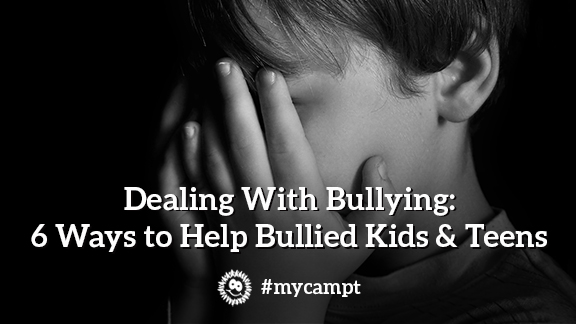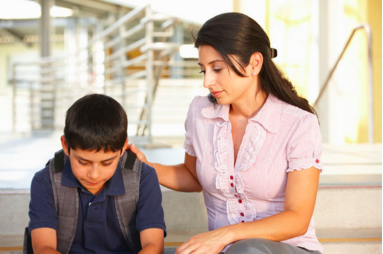Everyday, kids and teens across the country wake up scared to go to school. 1 in 3 Canadian teens have reported being bullied, and 47% of parents report having children who are being bullied. We take bullying very seriously at our French Camps.
Bullying is intentional tormenting in verbal, physical or psychological ways. It can range from children being taunted, teased, extorted of possessions, shunned or even physically pushed, shoved, or hit. When children are being persistently tormented by one individual or group, studies have shown that it can lead to low-self esteem, anxiety and problems adjusting to school.
Your kids have a right to feel safe. And like all parents, you want to feel confident you can help your child during these stressful times. Through our French Camps, we have learned many strategies to deal with bullying. And we have distilled down for you the 6 best ways to help your child if he or she is being bullied.
Here are 6 time-tested ways to help bullied kids & teens:
Bullying Prevention
At Camp Tournesol, we believe the first step to prevention is for every child to make a commitment to respect each other. That’s why, we ask our Overnight Campers, our Leadership campers and our CIT candidates to sign an Anti-Bullying Contract. The contract is a helpful reminder for kids and teens to continue to uphold outstanding behavior. Take a look at our contract.
Tweetable: “Be kind for everyone you meet is fighting a hard battle.” – Plato @CampTournesol
Be an anti-bullying advocate: take action
A very important aspect of bullying prevention is not only to teach kids who are bullied how to react, but to also teach bystanders to intervene. Actions can help to stop the bullying.
When someone takes a step to tell a bully it is not OK, it gives the victim the inner strength they need to stand up to the bully. Bullies like to be “cool”, so when their peers look down upon what they do, it loses its lustre.
If your child has a strong personality, is well-regarded at school and popular. then it’s even more important that your child take a stand against bullying. That is one of the most important teachings in our anti-bullying prevention teaching in our leadership program at our French camps. Stand up to bullying. Watch this eye-opening video with your child.
Role-Play Bullying Scenarios
When kids & teens are being bullied, they often feel frustrated because they don’t know how to respond. Practice role-playing with your child so you can help them come up with appropriate ways to respond to the bully. This might include helping your child practice being assertive by firmly telling the bully to stop. In other instances, it might be more helpful for your child to be non-reactive. They can do this by practicing how to act disinterested when the bully says hurtful remarks.
Remind Your Child It’s Not Their Fault
Many kids & teens feel embarrassed and ashamed that they are being bullied because they believe it’s their fault. Help them stop blaming themselves by reminding your child that he or she is not alone. Explain that many people get bullied at some point and that it is the bully who is behaving badly — not your child.
Brainstorm Cool-Down Strategies
Bullies are often looking for a reaction. So when a bullied kid or teen learns how to avoid getting upset, crying or looking angry, the bully will typically get bored and stop. You can help your child cool down by brainstorming effective cool-down strategies he or she can use the next time they encounter a bully. This might include counting to 10, taking 3 deep breaths or just walking away.
Talk To A Teacher or Counselor
If the bullying persists, or if physical threats are involved, it might be the right time to speak with a teacher or counselor. They will be your best point of contact to help prevent and address the situation on a day-to-day basis. It’s important for your child to feel a part of the decision to talk to a teacher. Often children are afraid the bullying will get worse if a teacher gets involved, so be sure to reassure them that their teacher is there to help and support them.
Now we want to hear from you:
What strategies have you used to help your bullied kids & teens?
Looking for a bully-free French Day Camp for your child? Learn more about Camp Tournesol here.




